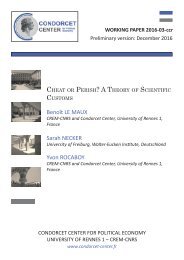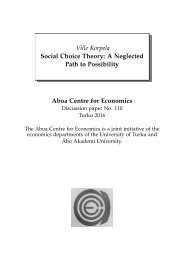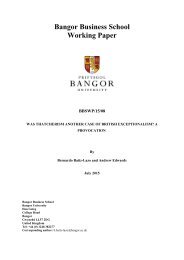MEMORANDUM
n?u=RePEc:hhs:osloec:2016_018&r=hpe
n?u=RePEc:hhs:osloec:2016_018&r=hpe
Create successful ePaper yourself
Turn your PDF publications into a flip-book with our unique Google optimized e-Paper software.
progress. He then had a meeting with the mathematician Emil Gumbel who helped him<br />
with some mathematical questions. Gumbel had mentioned Robert Remak whose work in<br />
Gumbel’s view was in mathematical terms similar to what Leontief was concerned with.<br />
The visit as whole had overall gone very well. The habilitation question was as open as<br />
earlier but that was to be expected. 154<br />
On his return to Berlin Leontief wrote immediately to Remak about Gumbel’s<br />
impression that they both had come to be concerned with similar problems, essentially<br />
“determinant analysis of economic equation systems”, Remak from the side of abstract<br />
mathematical economics and Leontief from the side of economic theory. 155 There is no<br />
record of a response from Remak or a meeting between them. Remak’s mathematical<br />
formulations had in fact striking similarities with input-output. But they were on different<br />
tracks: Leontief’s theoretical work was derived from the empirical problems he studied,<br />
while Remak was a mathematician.<br />
After the trip Leontief treasured the memory of the day spent in Bonn and the friendly<br />
welcome Schumpeter had given him. Leontief also came back to the Wagemann matter, i.e.<br />
whether there were any prospects for a position at the Konjunkturforschungsinstitut. He<br />
realized that there could be no question of getting a proper position when he in two months<br />
would leave for America. Leontief had got to know from an inside source that Wagemann<br />
was prepared to accept Leontief as an intern (Volontär) and also some kind of official<br />
relationship for the time Leontief would be in America, which might make the return to<br />
Germany easier. But Leontief whether it would be worthwhile for me to accept the<br />
awkward position of an intern and the loss of time it would involve. 156 Obviously, he was<br />
quite interested in Wagemann’s institute.<br />
Schumpeter and Leontief continued to stay in steady contact. At the end of June<br />
Schumpeter asked Leontief for guidance as to how to apply the demand and supply<br />
analysis. Leontief responded by page references to his paper, enclosing graphs, tables and<br />
explanations. Schumpeter wanted to know how things were going and whether he used his<br />
free time for something “beautiful and new”, or had given himself away to Wagemann?”<br />
On the Wagemann matter Leontief was still undecided and apparently not very inclined to<br />
accept the conditions he had been offered. He was furthermore dismayed by the fact that<br />
the Eisenaufsatz would not appear in the July issue of Weltwirtschaftliches. It had been<br />
submitted one month ago but nothing had been done with it with regard to the technical<br />
editing. And to get a copy of the article (for Schumpeter) was impossible. 157 It appeared<br />
eventually in January,1932.<br />
154 Leontief to Schumpeter, 7 June 1931.<br />
155 Leontief to Remak, 11 June 1931. About Remak, see the account in Parys (2013, 2014).<br />
156 Leontief to Schumpeter, 7 June 1931.<br />
157 Schumpeter to Leontief, 20 June 1931; Leontief to Schumpeter, 23 June 1931.<br />
65





